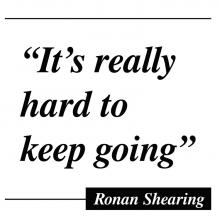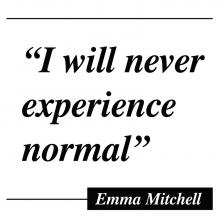
For 2022’s year 13 pupils, their entire NCEA studies have been significantly affected. Southern Issues reporter Daisy Hudson will follow three southern high schoolers through their final year at school, to hear first-hand how the pandemic has changed their lives.
In the first of this three-part series, she delves into the past two years of ups and downs, and their hopes for the year ahead.
High school is hard enough.
There are social changes, physical changes, the pressure of trying to work out who you are and who you want to be.
There are after-school jobs, sports and art events, parties and formals, and social media to contend with.

And that is before you add in the actual schoolwork.
Now imagine trying to navigate through one of the most formative times of your life in the midst of a global pandemic.
For the class of 2022, they do not have to stretch their imaginations very far.
At the start of 2020, this cohort of teens were beginning their first year of NCEA against a backdrop of a rapidly spreading global health crisis.
It was a time of massive uncertainty, both from a health perspective and in terms of what it would mean for their educations. Countries around the world were entering strict lockdowns, with schools closed and people forced to spend most of their time inside their homes.
By March, that was the reality for New Zealanders as well, as Covid-19 began to spread throughout the country.
In the two years since the virus arrived on our shores, these teenagers have been working through their studies amid repeated lockdowns, varying restrictions and widespread disruption.
It has changed their lives and, for many, the futures they might have imagined for themselves post-school.
It has forced them to adapt to new ways of learning, and exposed disparities in the education system.

Emma Mitchell (17) had a particularly nervous start to the pandemic. She is a pupil at Dunedin’s Logan Park High School which, in March 2020, had the dubious honour of becoming the first New Zealand secondary school to record a case of Covid-19.
There was fear and uncertainty. Emma says the pupil with Covid was involved in a lot of activities at the school, and she sat beside them in English.
That meant she and her family had to get tested and were already self-isolating when the country went into its first nationwide lockdown on March 25.
Learning immediately went online. Schools grappled with how best to keep pupils engaged and on track, while also battling disparities in technology and reliable internet access.

The first lockdown was not too tough, Emma says.
‘‘I don’t know what NCEA is like without it being disrupted. Ignorance did feel like bliss in that sense.’’
She enjoyed working from home, being independent and getting away from the structured class routine.
The second lockdown came towards the end of her year 12 year. It was a markedly different story from the first.
‘‘I don’t know a single person who liked lockdown 2.0. It was hard because it was at the end of the year. There was no motivation because you sort of felt like you could come out of it at any moment weirdly, because there was none [Covid cases] down here in the South Island.’’
Like Emma, Ronan Shearing (17), of Invercargill, found motivation a struggle at some points.
The James Hargest College pupil says the back and forth between restrictions made things tricky.
‘‘It’s nice to try to keep school and home reasonably separate. Yeah, it was quite hard to stay motivated and keep doing the work.’’
Over in Queenstown, Wakatipu High School pupil James Scoles (17) experienced the same thing.

‘‘In the first lockdown I did quite well. Online assessments were pretty tricky and they have been and always will be a challenge.
‘‘In the second lockdown I really dropped off and got no work done for three weeks.
‘‘From a personal experience it’s just made it really unsteady and my work ethic really ebbs and flows.’’
The statistics back them up.
An Education Review Office report into the impacts of the first year of the pandemic found 26% of surveyed year 11-13 pupils either disagreed or strongly disagreed that they were coping well with schoolwork while learning at home.
Only 28% of surveyed teachers in low-decile schools were confident their pupils would be able to catch up with their learning.
‘‘Disengagement normally increases as students get older but there is a real risk that the disruption caused by Covid-19 has increased the pool of disengaged students which, if not addressed, could lead to more students leaving school early or not continuing with their education after they finish school,’’ it noted.
Emma found part of the issue was perspective. Things that had once seemed vital were now minor in the new normal.
As she puts it, ‘‘in the grand scheme of things, there’s an actual pandemic going on, who cares if you got a merit or an excellence?’’.
‘‘That’s where I almost got torn because I felt like they didn’t matter in the grand scheme of things because people are getting sick and dying all over the world, left right and centre, and you’re being pressed for an English essay.
‘‘I think I got too caught up in the big picture, I think that’s where I sort of struggled a lot with the... ‘we’re all going to die’.’’
There was recognition from the New Zealand Qualifications Authority (NZQA) that pupils were doing it tough.

Learning recognition credits were awarded, depending on the level of disruption, and many assessment deadlines and exam dates were pushed back to give pupils more breathing room.

Pupils in Auckland, who stayed in lockdown for a much longer period last year, were also given additional support.
The shifting deadlines helped in some ways, the southern pupils say, but could also make it difficult to adjust to normal deadlines during less restrictive periods.
Emma even contemplated not returning to school for her final year, wondering if getting out into the real world and working on passion projects would be a better use of her time, but ultimately decided to go back.
In many ways, this age group was better prepared for the changes wrought by the virus than older generations. They tend to be more tech-savvy, with much more of their lives spent online, and they are generally better equipped for learning more independently.

But it is not just their schooling that has been disrupted.
Socially, they had to switch from seeing friends every day to having to catch up online.
The pupils talk about the impacts on mental heath, and the importance of getting outside both for exercise and to get away from the confines of their homes during lockdown.
A school production James was involved in was postponed multiple times, and when it did go ahead could only be performed in front of a reduced crowd.
It was good people were being cautious, he says. But it was frustrating.
Ronan, an avid cyclist, had hoped to represent New Zealand at the Oceania Championships. They were cancelled both of the years he was eligible to compete.

He was also supposed to attend a national science and technology forum in Auckland at the start of this year, but that too was scrapped.
‘‘With the lack of opportunities, or the opportunities that are being presented and then cancelled, it’s really quite hard to keep going.
‘‘To know going into lockdown that we’re not going to have events for however many months, or that when we do have an event it’s probably going to get cancelled... it just makes it really hard to keep training, it takes so much energy to keep working towards that.’’

All three pupils hope to transition into tertiary study next year, Emma to polytechnic and the two boys to university.
They are hopeful those plans will not be affected by Covid developments this year, although James acknowledges classmates who want to travel or study abroad post-school may have to rethink that.
*
All three agree the experience of studying through the pandemic has made them more resilient, and more adaptable.
Ronan says he just takes things week by week, rather than looking too far ahead.
‘‘I think it’s going to make us a lot more adaptable, because we’re just going to have to take things as they come.’’

‘‘I almost feel like you’re more willing to jump into something. If something’s going to go wrong I at least want it to go wrong trying something I really enjoyed.’’
While they have adapted, they do acknowledge it is strange to sit back and think about being a teenager during such a monumental shift in society.
‘‘You just sort of pinch yourself because you go, ‘I will never experience normal’,’’ Emma says.
‘‘And that’s fine, I can totally cope with this being normal, but just knowing that this is never going to be normal for anyone else.’’
The gravity of the situation has not been lost on them.
For James, it reminds him of an assignment he did in year 11 where he had to talk to someone who had lived through the Vietnam War.
‘‘I can’t help thinking of a scenario where the roles are shifted and in my later years someone’s going to ask me what it was like to live through Covid-19 as a student.
‘‘Of course it’s a unique experience and you can always go into hypotheticals about whether other generations would have handled it differently or done it better or worse. It has been hard undoubtedly — people’s mental health has suffered, people’s academics have suffered — but hopefully we’re in the final sprint with this year and hopefully it won’t hit anyone else too hard.
‘‘I don’t know about us doing well, we’ve done the best we can.’’
- This article marks the first work produced by our new Southern Issues reporter, an investigative role funded by the Public Interest Journalism Fund. As part of the role, journalist Daisy Hudson will take an in depth look at issues affecting Otago and Southland communities. She will examine topics and trends in all areas of Southern life, from local government to the economy, education to housing, health to infrastructure and everything in between. This work will expand on the Otago Daily Times' commitment to bringing you the stories of our people and the matters that affect them.
- Graphics by Mat Patchett










